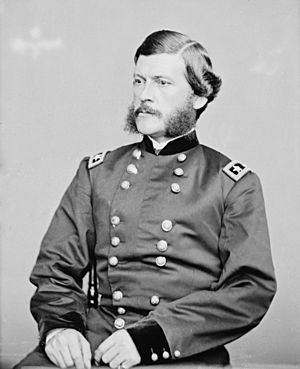John Parke facts for kids
Quick facts for kids
John Grubb Parke
|
|
|---|---|
 |
|
| Born | September 22, 1827 Chester County, Pennsylvania |
| Died | December 16, 1900 (aged 73) Washington, D.C. |
| Place of burial |
Philadelphia, Pennsylvania
|
| Allegiance | United States of America Union |
| Service/ |
United States Army Union Army |
| Years of service | 1849–1889 |
| Rank | |
| Commands held | IX Corps |
| Battles/wars | American Civil War |
| Signature | |
John Grubb Parke (born September 22, 1827 – died December 16, 1900) was an important United States Army engineer. He also became a Union general during the American Civil War.
Parke often worked closely with General Ambrose E. Burnside. He served as Burnside's main helper, or chief of staff, in big battles like Antietam and Fredericksburg. Parke also led troops in battles such as the Vicksburg Campaign and the battle of Fort Stedman. He even briefly commanded the entire Army of the Potomac.
Contents
Early Life and Engineering Adventures
Parke was born in Coatesville, Chester County, Pennsylvania. He went to the United States Military Academy and finished in 1849. After graduating, he became a young engineer in the Army.
As an engineer, Parke had many exciting jobs. He helped map the borders between states, like Iowa and the Little Colorado River. He also surveyed routes for a railroad that would stretch from the Mississippi River all the way to the Pacific Ocean. From 1857 to 1861, he was the chief surveyor for the team that mapped the border between the northwest United States and British North America (which is now Canada).
Civil War Service
When the Civil War began, Parke quickly rose through the ranks. He was made a brigadier general and led a group of soldiers in North Carolina in early 1862. He earned a special honor for his bravery at the Battle of Fort Macon. By July 1862, he was promoted to major general.
Working with General Burnside
In the Army of the Potomac, Parke briefly commanded a division within the IX Corps. He then became General Ambrose Burnside's chief of staff. This meant he was Burnside's top assistant and helped plan strategies for major battles like Antietam and Fredericksburg.
Later, Parke took command of the IX Corps and moved to the western part of the war. There, he helped in the important Vicksburg Campaign. After that, he was again Burnside's chief of staff in the Army of the Ohio, helping to defend Knoxville.
Leading the IX Corps
Parke continued to serve as Burnside's chief of staff during the Overland Campaign. He also helped at the start of the Siege of Petersburg. After the Battle of the Crater, General Burnside was removed from command, and Parke took over the IX Corps. He led his troops in several battles around Petersburg, including the Battle of Globe Tavern, the Battle of Peebles' Farm, and the Battle of Boydton Plank Road.
In 1865, Parke briefly became the acting commander of the entire Army of the Potomac during the Battle of Fort Stedman. This happened when the main commander, General George G. Meade, was away at a meeting. Parke led the IX Corps through the final stages of the war, including the fall of Petersburg and the Appomattox Campaign. For his excellent service at Fort Stedman, he received another special honor, becoming a brevet major general in the regular army.
After the War
After the war ended, Parke continued to serve in the Army. He commanded the IX Corps in Washington, D.C., and briefly led another group of soldiers called the XXII Corps. He left the volunteer service in January 1866 but remained an engineer in the regular army.
Parke was promoted to lieutenant colonel in 1879 and then to colonel in 1884. From 1887 to 1889, he was the Superintendent of the United States Military Academy (West Point), which is where he had studied many years before. He retired from the Army in July 1889.
Even after retiring, Parke continued to contribute. He wrote many reports about public projects and explorations of the western United States. He was also a talented mapmaker, creating detailed maps of places like New Mexico Territory and California.
John Grubb Parke passed away in Washington, D.C., on December 16, 1900. He is buried in Philadelphia.
See also
- List of American Civil War generals (Union)
 | James Van Der Zee |
 | Alma Thomas |
 | Ellis Wilson |
 | Margaret Taylor-Burroughs |

